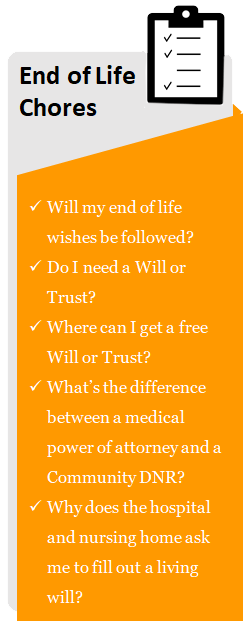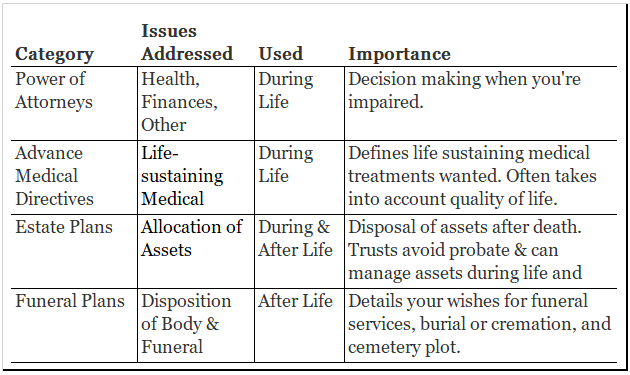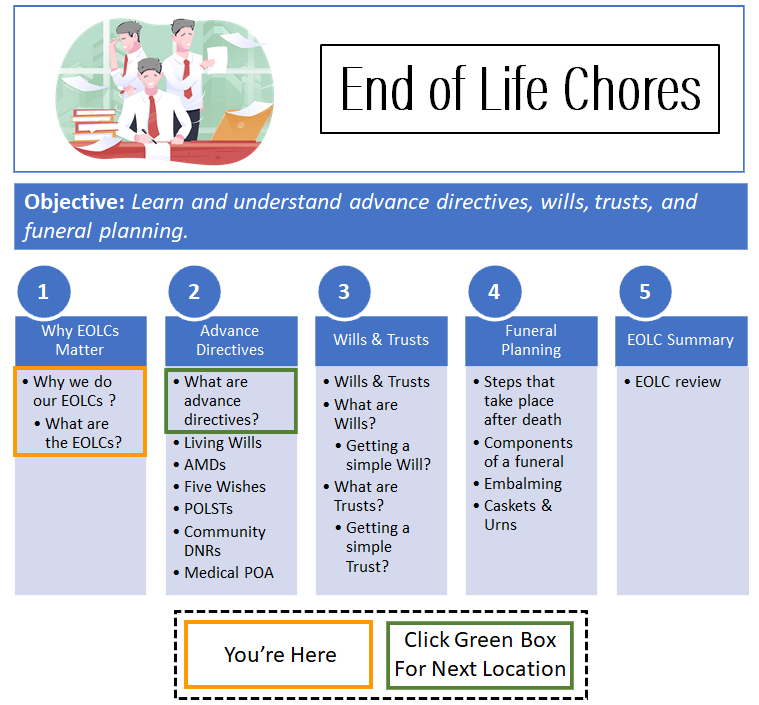End of Life Chores (EOLCs)
Click here to see what's on this page.
End-of-life chores are the tasks every senior should complete so that their wishes are known to others, and the others don’t have to guess what their loved ones want. The tasks vary but include things like medical treatments to prolong life, where you want to live, and who makes decisions for you when you can’t.

Everyone has chores. If you’re a senior, these are yours.
My mom keeps me grounded and all that. She makes me do chores.
Auli’i Cravalho
CarePlanIt wants to keep you grounded too. DO YOUR CHORES!

You don’t get a job without skills, knowledge or training. Add to that a bad attitude and most people, including every employer, would really question your sincerity.
But this is how many seniors approach the end of their lives. They don’t plan, put in place key documents, or inform their family of their aspirations and concerns.
Super Agers are different. They do their end of life chores.
CarePlanIt’s EOLC Master Technique teaches you what they are, and how to do yours.
We’re asked to do chores by our parents to teach us responsibility, keep the house in order and contribute to family harmony. The implication is that if we don’t do the chores, we’re irresponsible, disorderly, and cause family disharmony. As kids, not doing chores creates more work for our parents, but it doesn’t necessarily mean we grow up to be delinquents or are unable to participate in a happy family. Kid chores, after all, are usually not life-altering.
As Adults, We Must Do Our EOLCs
As Agers, end-of-life chores are life-altering. They involve things like:
Carmen and I call these, “end of life chores.” Certain things you just have to do when you get older. We call them “chores” because you’d never do them to have “fun.” But doing them allows you to manage your end of life care, how your assets will be disposed of and aid your loved ones during a time of crisis. These chores involve creating documents and plans concerning your end of life.
Why We Do Our End of Life Chores
You do them for one or more of the following reasons:
You Want to Manage the End of Your Life
Many people are concerned about how they live the last days of their life. Perhaps you’ve visited a nursing home, or a sick relative in the hospital and had opinions about how you’d do things. Did you notice feeding tubes or ventilators? Maybe you learned that a ninety-year-old relative had heart surgery and died in the operating room. Witnessing or thinking about these things may lead you to want to determine where you pass or how your medical care will proceed if you become incapacitated or cognitively impaired. You may also care how your assets are disposed of after death. Or maybe you have strong opinions about which of your children are best prepared to wrap up your affairs. Your end of life chores address these issues.
You’re Responsible
Responsibility is defined as having an obligation to do something. But I like to think of your end of life chores as a communal or cultural act. When you attend Church, or other places of worship, you experience traditions. Not just in what you read, but rites and ceremonies; and in songs and chants. In many families, attending religious services was ritualistic. Be it every Sunday, on holidays, or both, most of us continue to have, or at least remember the experience.
EOLCs Are Like Religious Traditions
These chores we do toward the end of our life are like these religious traditions. They tie together families and generations. They make up our shared culture. They create frameworks in which our lives are led.
When Carmen and I first worked on this section, we used the term responsory to describe EOLCs. A responsory is any psalm, canticle or other sacred anthem sung by two groups.
Often a cantor or a small portion of the choir, followed by the congregation. It is a shared recital involving a historical and known verse.
We thought of end of life chores are the same. A way for family and community to respond to important issues, when the senior is cognitively impaired or dead. If you can’t respond, the anthem is missing an important partner. The partners trying to sing your part, don’t know what you want sang. Worse, they sing or respond based on their perceptions and desires, not yours.
It’s your end of life. Your song, your anthem. CarePLanIt’s recommended end of life chores are the rituals that will allow your family and community to follow your wishes and goals. To navigate the issues associated with your end of life and beyond your way.
You Don’t Want to be a Burden on Others
A universal fear among seniors is the thought they will become a burden on their children. What does this mean? For many, it’s the thought of their aging issues disrupting their children’s and grandchildren’s life. Carmen and I talked to many seniors who suggested that they didn’t want their children’s life disrupted because of their aging issues. We heard many statements like “I’ve led my life. I don’t want my children to stop living theirs because of me.”
The Super Agers Carmen and I met all said something to the effect of “If we don’t make plans, and make our intentions known, we may disrupt our children’s lives.” When we asked what they were concerned about we heard things like:
We don’t want our children…
Super Agers Do Their EOLCs For Their Children
Many of the Super Agers knew the stress their own aging issues can have on children. They heard the horror stories of children moving, quitting their jobs and depleting their savings to care for parents. Super Agers knew the results of this stress: divorce, family estrangements, and alienation. Our Super Agers all had plans. Plans in the form of EOLCs.
Many of the non-Super Agers we talked to insisted the above scenario could not happen to them. They didn’t have their EOLCs complete. They often said our kids know what we want. We asked what they wanted and took notes. On the opportunities Carmen and I had to follow up with their children, we discovered that their children had different ideas of what these wants were. More disturbing, siblings had different ideas, and they insisted on their ideas of what their parents wanted, came from their parents. In other words, siblings believed they knew what their parents wanted, and it differed. Often dramatically. This occurred with seniors in good health and with good relationships with their children.
It Can Happen To You
Can’t happen to you? Have you taken into account the chances of early dementia symptoms? Mood swings? Disagreements with your children? Problems with your grandkids? What about our own irrational behavior? All of these can create complicated issues for us and our children. If we haven’t done out EOLCs, our children don’t know what we want.
NOTE: Carmen and I have met seniors that think of themselves as a bad person or a person who has done bad things. Many believe that because of this their children won’t come to their rescue. That’s not the way it works. Let us repeat: that’s not the way it works. Good people do the right thing. And unless you’ve raised a sociopath, you should expect your child to come to your aid in your old age. Make it as easy as possible for them. If not for them, for your grandchildren, your siblings, your community or your God.
What are the End of Life Chores
There are four categories:
- Power of Attorneys (generally for health care and financial matters)
- Advanced Medical Directive
- Estate Planning Documents (Wills, Trusts) and Activities (transferring assets to trusts and/or adjusting ownership of assets for easier access upon death)
- Funeral Plans
Power of Attorney
Power of Attorneys (POAs) give another person the right to act on your behalf. An Advance Medical Directive documents your wishes regarding care at the end of your life. Estate planning documents (wills, trusts, etc.) detail how your assets and affairs are to be handled after your death. Funeral plans involve how you want to dispose of your body and how these services are to be paid.
A Short Comment on Terms and Terminology
Carmen and I were shocked at how many big institutions eagerly handed you important documents and asked you to deal with them during periods of crisis. When we helped check our mother into a rehabilitation facility, they handed us an advance medical directive form. When my siblings and I were in the hospital with our father they asked us to address a do not resuscitate form.
These institutions want to address their own legal issues and concerns. They will ask you who has Medical Power of Attorney. And then ask that person to complete their forms.
When Document Conflict, Or Not All Family Members Know About Documents, Confusion Ensues
These institutions have no idea what your loved ones want. If you don’t have your loved one’s documents in hand and a knowledge of what they want, it’s easy to get pushed into doing things from the institution’s point of view (or from your point of view). If you and your family have not planned for this, it’s easy to get confused.
For example, say I go into the hospital and my son has my Medical Power of Attorney. Does that POA reference my Advance Medical Directive? If not, my son may make his own decisions during a time of crisis (which I don’t want him to have to do).
Carmen and I have witnessed and heard of hundreds of cases where a dying parent wants to die at home and not have any inappropriate life-prolonging medical interventions. They have even gone to great lengths to describe what “inappropriate” means. Usually, it’s something related to interventions that will not clearly increase their quality of life. These goals are often unintentionally and sometimes intentionally ignored by grieving children who can’t bear to lose their parent on their watch or before a significant event for them like Christmas, Thanksgiving, or their child’s upcoming graduation.
Minimize Confusing Terminology, Minimize Mistakes
CarePlanIt is a manual or framework to help you quickly identify what you need to do as a responsible senior, and get it done fast. As such we don’t want to use confusing terms or call things names that might seem to reference something different. In short, we want to use specific terms to reference specific document types that address different challenges.
That’s how you stay in control. That’s how you can tell an institution: We have an Advance Medical Directive for the patient. Hand them a copy and they are now working to address the patient’s wishes.
Power of Attorneys: we use the term POAs and advocate the use of these documents to allow others to act for you in health and financial matters.
Advance Medical Directive
Advance Medical Directive (AMD): we use this term and the use of this document to cover in detail the type of medical care you desire when you become cognitively impaired. We don’t use “living will” and encourage you to do the same.
Estate Planning Documents
Estate Planning Documents: we use this term and the use of these documents to detail and plan how your assets will be administered after your death and who will administer those assets on your behalf.
Funeral Plans
Funeral Plans: we use this term for details and plans concerning your funeral and how it will be paid.
Summary

Other Resources On End Of Life Chores
Great state resource on POAs and AMDs here.
Another great resource here.
